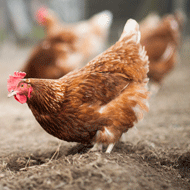Avian influenza case officially confirmed

Tests have identified a 'very mild strain' of the H5N1 virus at a poultry farm in Fife.
A strain of avian influenza reported on a poultry farm in Fife has been officially confirmed.
The Scottish Government say that tests have identified a 'very mild strain' of the H5N1 virus and a humane cull of around 40,000 birds has now begun.
Chief Vet Sheila Voas said: “The lab has now formally confirmed the presence of a very mild form of H5N1 avian influenza on a poultry farm near Dunfermline. It is important to stress that this strain is quite distinct from the highly pathogenic form of H5N1 that has caused significant problems over the past decade or so around the world.
“Robust precautionary measures have been in place since suspicion of disease was first reported, in line with our well-rehearsed contingency plans for dealing with avian influenza, and so today’s formal confirmation is something of a technicality."
Restrictions on the movement of poultry and birds for one kilometre around the affected premises will remain in place for 21 days after preliminary cleansing and disinfection.
Sheila adds: “The eggs supplied by this broiler breeder unit are not for human consumption but are sent to a company hatchery. As a precaution, those eggs are being destroyed and the movement of poultry or poultry products at that site is restricted until that process is complete.
“Investigations into the possible source of this infection are at an early stage, but it is normal for such viruses to circulate among wild bird populations, especially waterfowl. Therefore it is important that poultry keepers remain vigilant for any signs of disease and to ensure they are maintaining good biosecurity on their premises.”
The cull on the farm is being carried out by the Animal Plant and Health Agency (APHA) on behalf of the Scottish Government.
Avian Influenza is a notifiable disease. Anyone who suspects an animal may be affected by a notifiable disease must report it to their local Animal Plant & Health Agency (formerly AHVLA) office.



 The Veterinary Medicines Directorate (VMD) is inviting applications from veterinary students to attend a one-week extramural studies (EMS) placement in July 2026.
The Veterinary Medicines Directorate (VMD) is inviting applications from veterinary students to attend a one-week extramural studies (EMS) placement in July 2026.